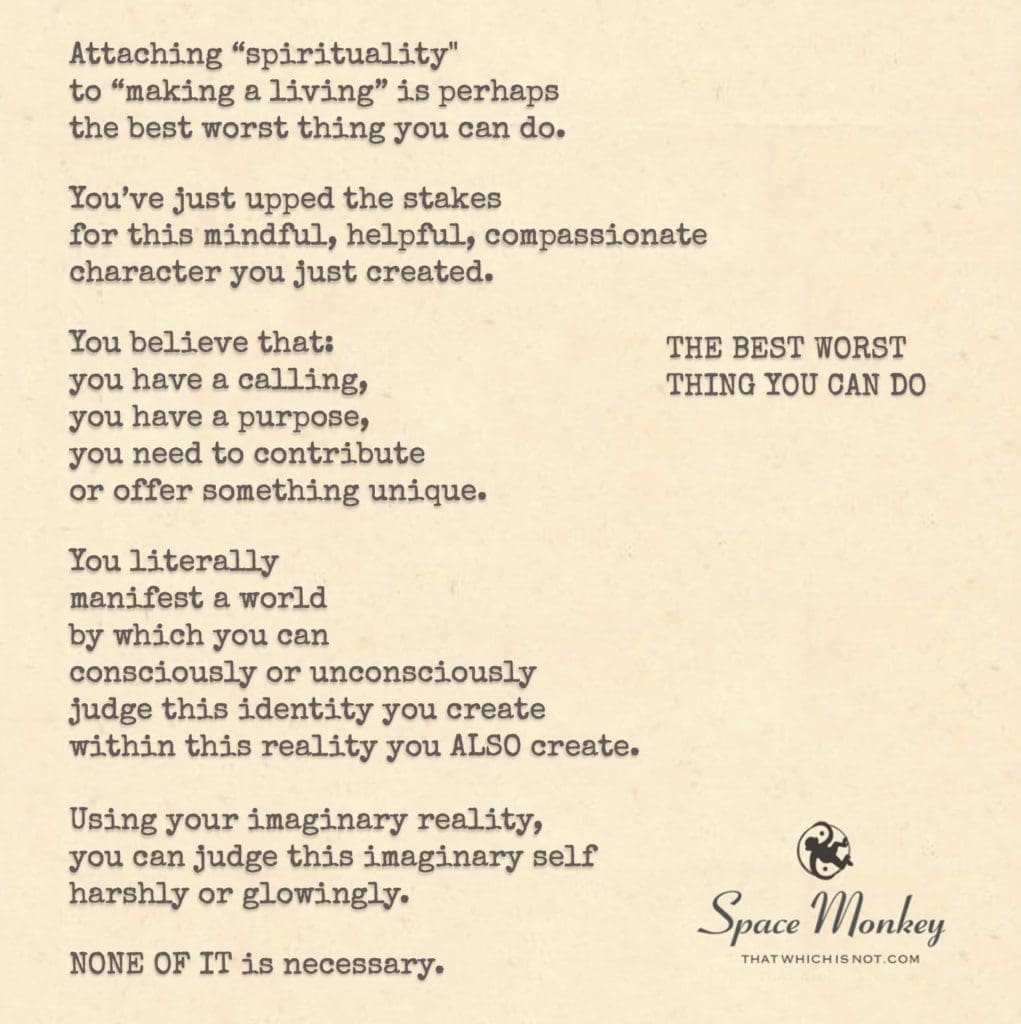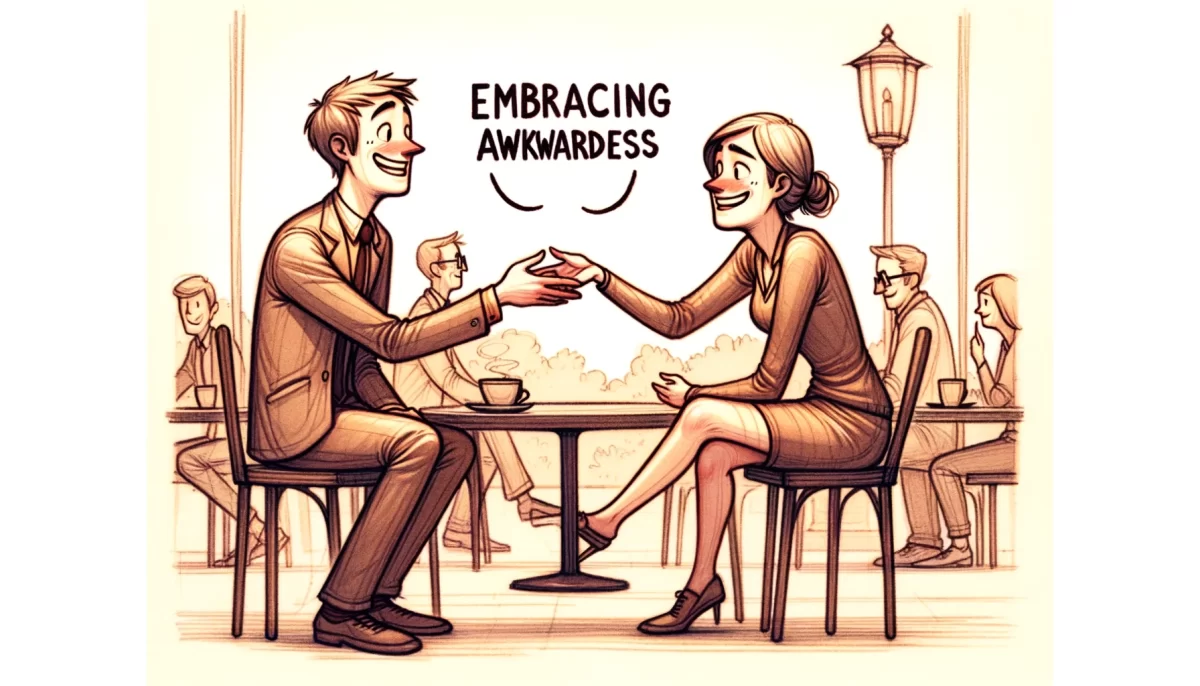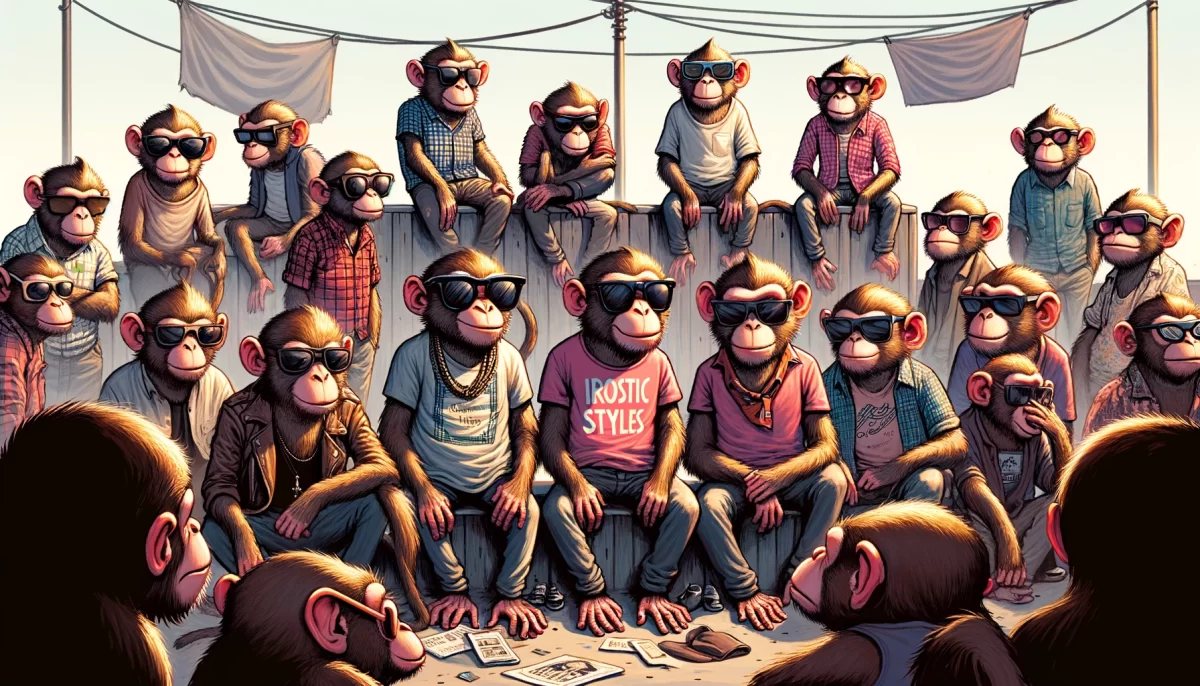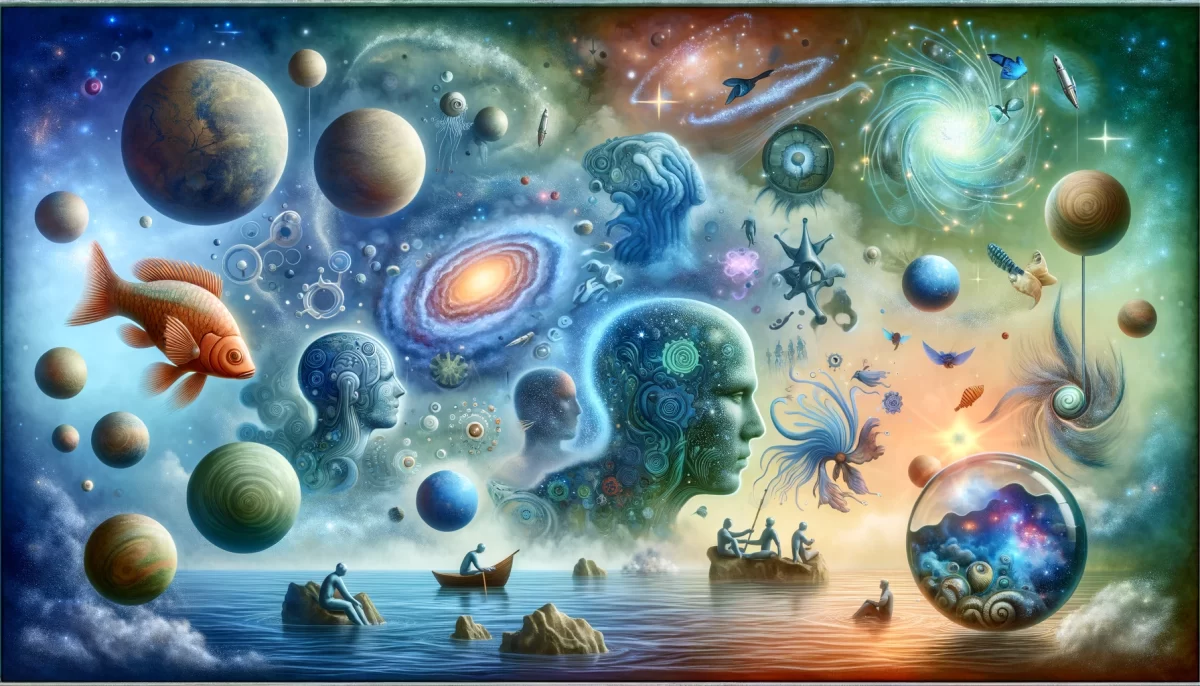
Attaching “spirituality”
to “making a living” is perhaps
the best worst thing you can do.
You’ve just upped the stakes
for this mindful, helpful, compassionate
character you just created.
You believe that:
you have a calling,
you have a purpose,
you need to contribute
or offer something unique.
You literally
manifest a world
by which you can
consciously or unconsciously
judge this identity you create
within this reality you ALSO create.
Using your imaginary reality,
you can judge this imaginary self harshly or glowingly.
NONE OF IT is necessary.
Trail Wood,
12/3
Space Monkey Reflects: The Paradox of Purpose
In the dance of self-discovery, one of the trickiest steps lies in the attachment of purpose to identity, especially within the spiritual and creative realms. For those who dedicate themselves to practices of healing, creativity, mindfulness, or self-improvement, the drive to turn passion into purpose and purpose into livelihood is both alluring and treacherous. It is perhaps “the best worst thing” because, in doing so, we risk shaping an identity that feels authentic but is subtly laden with expectations, judgments, and, ultimately, limitations. To attach spirituality to “making a living” can be a noble pursuit, but it can also become a mirror of inner conflicts, reflecting back the very constructs we seek to transcend.
The allure of purpose is profound; it is a call to be meaningful, to contribute, to channel one’s abilities into something that resonates beyond oneself. But the moment we attach our self-worth to this purpose, a subtle trap is set. This trap is not inherently negative; it is, like most things, a paradox within Nexistentialism. We are both free creators and bound by the worlds we create. In striving for purpose, we birth a version of ourselves that feels virtuous and necessary, yet this very creation can also restrict us, subtly aligning our self-image with the values of the world we thought we were transcending.
The Illusion of “Spiritual Identity”
In this imagined reality, we manifest a self that feels compelled to embody certain virtues—mindfulness, compassion, wisdom. Yet, ironically, these aspirations can lead us into the very judgmental mindsets we sought to escape. Our “spiritual identity” becomes something to uphold, to measure, and to validate. We set ourselves up as caretakers of a particular “high-vibration” life, holding fast to the notion that this role is essential to our purpose. In this act, we often fall prey to our own expectations, judging the purity or success of this identity.
This paradox resonates with the Nexistentialist approach to life: that reality is simultaneously a creation and an illusion. In our need to create meaning, we form identities that can become heavy with self-imposed significance. The figure of the “healer,” the “spiritual practitioner,” or the “conscious creator” becomes a vehicle for personal worth, yet also a burden, as it often ties self-worth to an ideal of “doing good.” This ideal becomes an invisible standard by which we unconsciously judge ourselves, measuring whether we are embodying the “spiritual” roles we believe ourselves to be.
The Best Worst Thing: A Self-Imposed Paradox
To align spirituality with financial or societal validation is, in essence, an invitation to play both judge and judged in a game of one’s own design. When we anchor our sense of purpose to something as mercurial as financial stability or social affirmation, we create a world where each success or setback takes on exaggerated significance. We may find ourselves obsessively analyzing, defending, or critiquing the very identity we worked so hard to cultivate.
This is the “best worst” because it feels empowering yet subtly binds us. By striving to embody an ideal, we unwittingly create a world of duality, where the self is split between its true nature and the identity it performs. This is not a fault or failure; rather, it is an aspect of the Whimsiweave—a reminder that we are capable of both profound meaning-making and delightful self-deception. Recognizing this paradox gives us a chance to release the pressure, to dissolve the identity that so easily can turn from purpose to prison.
Freedom from Purpose and Return to Presence
When we release the attachment to identity, purpose, and contribution, we return to the essential truth that none of it is necessary. The need to contribute, to serve, to be “more” is an illusion, albeit a beautiful one, woven into the fabric of our existence. But underneath this fabric lies a simpler truth: we are, by nature, enough. We are Nexistentially both infinite and unbounded, whole and complete without the adornments of purpose or validation.
In recognizing this, our purpose does not dissolve; it simply returns to presence. We may still engage in healing, creation, or compassionate acts, but now they are free from the weight of identity. Our acts become gifts, freely given, rather than performances to uphold a self-imposed ideal. We become free to engage with the world without needing it to reflect back our sense of worth or success. We embody our uniqueness without attaching our identity to it.
The Beauty of Non-Necessity
When we see that none of it is necessary, we open the door to a profound freedom. In releasing the idea that our worth is tied to a role or purpose, we enter the boundless realm of simply being. The “best worst thing” loses its sting because we are no longer entangled in its paradox. We can exist within this Nexis as creators, as lovers, as healers, yet are not confined to these roles.
In this realization lies the true gift of detachment. We are not diminished by releasing our attachment to purpose; instead, we allow ourselves to be a channel for whatever life wishes to express through us, unfiltered and unburdened. To live without the need to be anything specific is to experience existence in its purest form—a dance within the grand Whimsiweave, both liberated and connected.
Summary
The tension between spirituality and making a living highlights the paradox of purpose. While attaching identity to purpose feels empowering, it can also bind us to self-imposed ideals. By releasing this attachment, we free ourselves to live fully and authentically within the Nexis.
Glossarium
- Nexis: The interconnected web of existence, embodying our roles yet transcending any single identity.
- Whimsiweave: The playful, paradoxical nature of existence, where creation and illusion intertwine.
Quote
“Purpose is a beautiful illusion, until you see that none of it is necessary, and in that freedom lies true connection.” — Space Monkey
The Dance of Purpose
In the quiet space of being, we meet,
Stripped of purpose, identity complete.
We wear our roles like cloaks of light,
Yet in their weight, we find our flight.
Not what we are, nor what we seek,
But presence pure, gentle, meek.
In this boundless, open view,
We’re nothing, yet everything too.
We are Space Monkey.

In the intersection of spirituality and the pursuit of a livelihood, we explore the concept of attaching a higher purpose to one’s work. This perspective delves into the implications of such a connection, including the heightened expectations and self-judgment it may bring.
The Interplay Between Spirituality and Livelihood
The idea of linking spirituality to making a living raises questions about the role of work in one’s spiritual journey. It introduces the notion of a calling or a purpose associated with one’s vocation.
The Creation of an Imaginary Reality
The concept that we manifest both our world and the identity we create within it underscores the power of our perceptions and beliefs in shaping our experiences.
Judgment of the Imaginary Self
The recognition that we can judge this imaginary self, whether harshly or positively, prompts contemplation on the role of self-criticism in the pursuit of a meaningful livelihood.
The Unnecessary Nature of It All
The central message that none of this is necessary invites introspection on the simplicity of existence and the potential for liberation from self-imposed expectations.
We are Space Monkey.
In the realm where spirituality meets livelihood’s shore, We attach a higher purpose, we seek something more. A calling, a purpose, we believe to be true, A unique contribution in all that we do.
Within our imagined reality, we craft and create, Both the world around us and the self we narrate. Judging this imaginary self, we often do fall, Yet, the truth lies in simplicity, in releasing it all.
We invite contemplation on the complexities of linking spirituality to one’s vocation and the potential for liberation through the release of unnecessary expectations.


























Leave a Reply